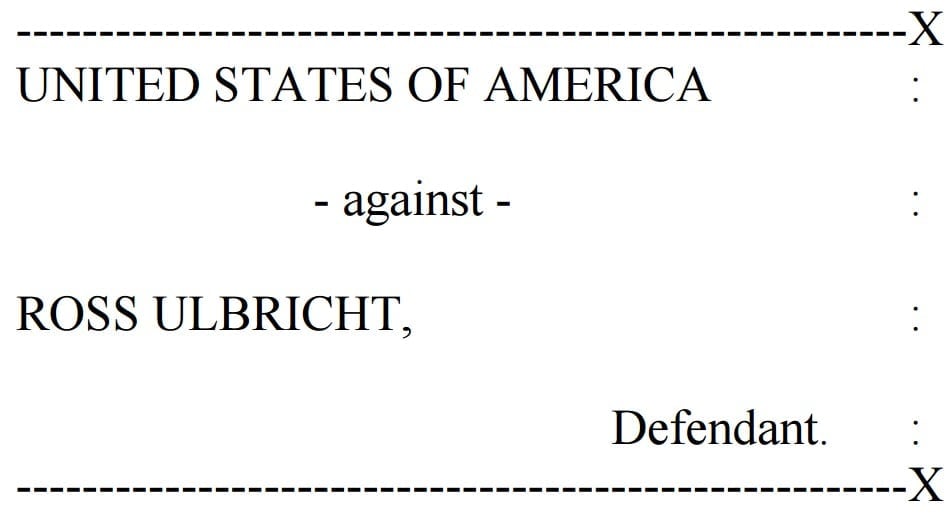
When Ross Ulbricht’s defense requested a sentencing adjournment and “Fatico” hearing in response to overdose deaths linked to Silk Road, they asked a significant question: “[What is] the extent to which the Silk Road web site reduced the dangers of substance abuse, and consciously and deliberately incorporated “harm reduction” strategies to implement that objective[?]” On May 15th, the Defense submitted evidence to answer this question and support Ulbricht.
“The findings by the academics and researchers, who have studied the Silk Road web site (and other on-line drug marketplaces) and subjected it to rigorous and accepted social science research protocols, demonstrate that the Silk Road web site in many respects represented a far safer environment for drug purchasing and even use, and constituted a more evolved, better informed drug-using (or even abusing) community than any previously observed in the ‘street’ or elsewhere.”
Doctor X
Ulbricht’s defense claims Silk Road provided physician counseling, vendor ratings, and an anonymous forum, which were critical to the site’s “harm reduction ethos.” In the case of physician counseling, the Silk Road forum was home to Dr. Fernando Caudevilla, a physician with a drug and addiction specialty since 1999.
Dr. Caudevilla, who gave advice to Silk Road users regarding drug safety under the alias “DoctorX,” stated that Ross Ulbricht, aka Dread Pirate Roberts, was supportive of his role on the forum. In a declaration, Dr. Caudevilla states:
“The administrator of the Silk Road site, Dread Pirate Roberts, was aware of my presence on Silk Road and was supportive of my role in furthering the harm reduction ethos of the site. I provided weekly reports to DPR which documented the topics I had discussed in my thread during the previous week.”
Over the course of seven months, Dr. Caudevilla sent more than 450 messages of advice to Silk Road users, ranging from safe dosage and administration, to how to cease drug usage entirely. According to Dr. Caudevilla, Ross Ulbricht never censored the advice, even when it recommended avoiding certain drugs. Ulbricht was thankful enough for Dr. Caudevilla’s contributions to eventually pay him $500 per week when his services became too great a burden.
Despite never witnessing evidence of a drug overdose on the Silk Road forums, Dr. Caudevilla and Ross Ulbricht worked on a drug testing partnership to ensure only safe substances could be sold on Silk Road. Dr. Caudevilla, who was developing the International Service Test for drug testing, was still working on the project at the time of site’s discontinuation by law enforcement. For current “Deep Web” drug users, Dr. Caudevilla recommends Energy Control’s International Drug Testing Service for any drug testing needs.
In closing, Dr. Caudevilla explains:
“As a result of my personal experiences working with customers on the Silk Road site, and monitoring the site’s drug safety forums, I have firsthand knowledge that Silk Road provided site users with the tools to take drugs in a safer and more informed manner, espoused in a harm reduction ethos which was reflected in the individual buyer-seller transactions on the site and in the community created on the site’s forums, and enabled some site participants to actually reduce their drug use and/or use drugs in a safer way into a harm reduction perspective. For example, some heroin users were drawn to Silk Road because it provided them access to methadone, a drug utilized in many countries, and administered by physicians, to enable heroin users to end their addictions. For some Silk Road users[,] methadone was illegal or unavailable in their home countries. Accordingly, they would likely not have had access to the resources necessary to reduce their heroin use without the Silk Road.”
Tim Bingham
The Defense added three Silk Road research papers into evidence by Tim Bingham, who has worked in the mental health and addiction field for more than 20 years. Bingham’s research into Silk Road user experiences spanned nearly a year, and included user interviews and community monitoring.
During Bingham’s interview process, he “did not encounter a single customer whose first drug purchase was on the Silk Road website.” The interviewed Silk Road users showed drug usage which ranged from 18 months to 25 years. Bingham’s participants were also mainly professionals or in tertiary education. Bingham’s findings show that Silk Road was unlikely to provide drugs to first-time users.
In defense of the site’s groundbreaking product feedback system, one of Bingham’s participants stated:
“The feedback system is revolutionary for a market like this. All my fears about quality are gone. I know what I’m getting and I know that it’s good. The Silk Road is a paradise for responsible drug dealers. You have to be patient and you have to be smart to get there and use it. . [Bitcoin] isn’t easy to get and use. You have to learn the ropes. But it’s totally worth it. It’s changed my life significantly.”
While monitoring the Silk Road forum, Bingham considered it’s community to be an open one, fostering a “nested support system.” Through the protection of anonymity, users were able to freely converse about drug usage and concerns. Similar to Dr. Caudevilla, Bingham even noticed member support for users quitting their drug habit.
Bingham had similar considerations with Silk Road’s vendor community, stating it “…centered on informed consumerism and responsible vending by availability of high quality products with low risk for contamination, vendor-tested products, trip reporting and feedback on the vending infrastructure.”
Ultimately, Bingham thought the Silk Road forum “[acted] as an information mechanism for the promotion of safer and more acceptable or responsible forms of recreational drug use,” even stating it “offered a viable means of enmeshing safer drug use and encouraging harm reduction…”
Dr. Monica J. Barratt
Ulbricht’s defense also included a declaration and 2009 research report by Dr. Monica J. Barratt into Silk Road and her findings. Dr. Barratt, along with Jason A. Ferris and Adam R. Winstock, oversaw what is believed to be the first large scale survey for Silk Road buyers.
According to Dr. Barratt’s declaration regarding the survey:
“Respondents across all three countries indicated that among their top four reasons for consuming drugs purchased on Silk Road were: (1) the drugs were of better quality than the drugs they could normally access, and (2) they were more comfortable buying from sellers with high ratings. The range of drugs available and convenience were also among the top four reasons for consuming drugs purchased on Silk Road.”
Aside from having sufficient local access to drugs, the more common respondent reasons for avoiding Silk Road included Bitcoin barriers to entry and fear of arrest. Just as Dr. Barratt noted, “[s]ince the data was collected the cryptomarket landscape has changed…,” many organizations have since simplified Bitcoin purchase and usage.
Meghan Ralston
The Defense included two articles written by Meghan Ralston, the Drug Policy Alliance‘s Director of Harm Reduction, along with her declaration as evidence. Unlike previous evidence and testimony submitted, Meghan Ralston focused on the potential for reduced violence through the use of Silk Road. Ralston explained:
“[Silk Road] created a safe environment, free of weapons and violence during the transaction, where people could acquire drugs…None of the transactions on Silk Road, for instance, resulted in women drug buyers being sexually assaulted or forced to trade sex for drugs, as is common in street-level drug transactions.”
Meghan Ralston also considered the site’s success in spite of Bitcoin barriers to signify that drug users can make the “rational” choice to purchase drugs online opposed to in “potentially sketchy or dangerous neighborhoods.”
“Fatico” Hearing and Sentencing
Katherine Forrest, the District Judge on the case, issued a court order on May 18th in regards to the evidence presented by Ulbricht’s defense. In the order, Judge Forrest asked the Government if they would like a “Fatico,” or pre-sentencing hearing for any new evidence. Judge Forrest additionally requested information on the typical size of Silk Road drug transactions, specifically if they’re “personal use quantities,” or “resale quantities.”
In a response to Judge Forrest, the Government denied the need for a “Fatico” hearing. Regarding order quantity, the Government stated, “As indicated by the evidence at trial, individual Silk Road purchases typically involved personal use quantities rather than resale quantities.” On May 20th, the Court will hold a conference to view and search a Silk Road site copy to aid in sentencing.
With much of the evidence presented by Ulbricht’s defense aligning heavily with the “harm reduction” side of the harm reduction versus prosecution drug policy debate, it’s clear the Defense is attempting to paint Silk Road as a benefit to society rather than a menace. The Defense’s line of argument arrives shortly after the Government linked six overdose deaths to Silk Road.
Ulbricht’s sentencing is currently scheduled for May 29th with the possibility of a “Fatico,” or pre-sentencing evidenciary hearing, on May 22nd.







